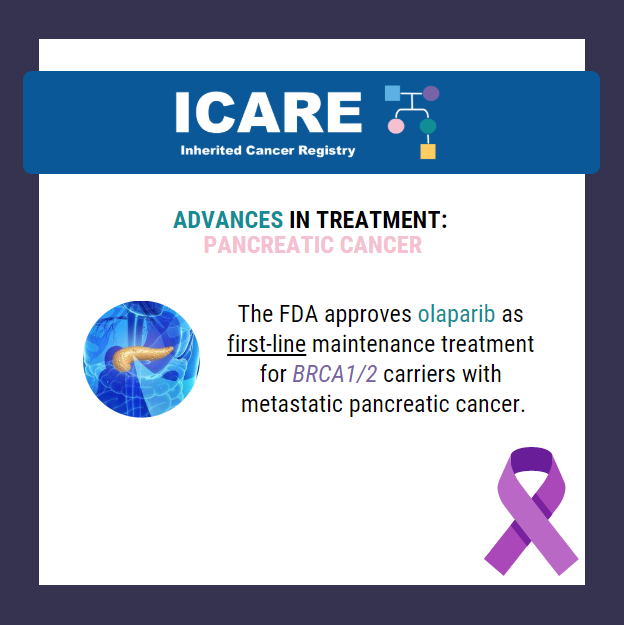 Results from a recent study showed olaparib (a PARP inhibitor) nearly doubled the progression-free survival in BRCA1/2 carriers with metastatic pancreatic cancer.1 Based on this data, the FDA approved the use of olaparib as a first-line maintenance treatment in BRCA1/2 carriers with metastatic, platinum-sensitive pancreatic cancer. This represents another treatment advance in pancreatic cancer and highlights the importance of genetic testing for all patients with pancreatic cancer.
Results from a recent study showed olaparib (a PARP inhibitor) nearly doubled the progression-free survival in BRCA1/2 carriers with metastatic pancreatic cancer.1 Based on this data, the FDA approved the use of olaparib as a first-line maintenance treatment in BRCA1/2 carriers with metastatic, platinum-sensitive pancreatic cancer. This represents another treatment advance in pancreatic cancer and highlights the importance of genetic testing for all patients with pancreatic cancer.
Another recent study among pancreatic cancer patients with a BRCA1/2 or PALB2 mutation showed that response rates after first line treatment with cisplatin/gemcitabine alone was 65.2%, and with addition of veliparib (a PARP inhibitor), it was 74.1%.2 The study evaluated each arm separately and did not compare them. Survival at 2 years and 3 years was also encouraging at 31% and 18%, respectively. These data highlight the importance of conducting testing for inherited cancer among all patients with pancreatic cancer, as this information may guide treatment among those identified to have inherited cancer gene mutations such as BRCA1/2 or PALB2.
1Golan, et al. N Engl J Med. 2019 Jul. PMID: 31157963; 2Helwick, C. The ASCO Post. 2020 Jan. Available at: https://www.ascopost.com/
Social media post: https://tinyurl.com/ICARE202013
